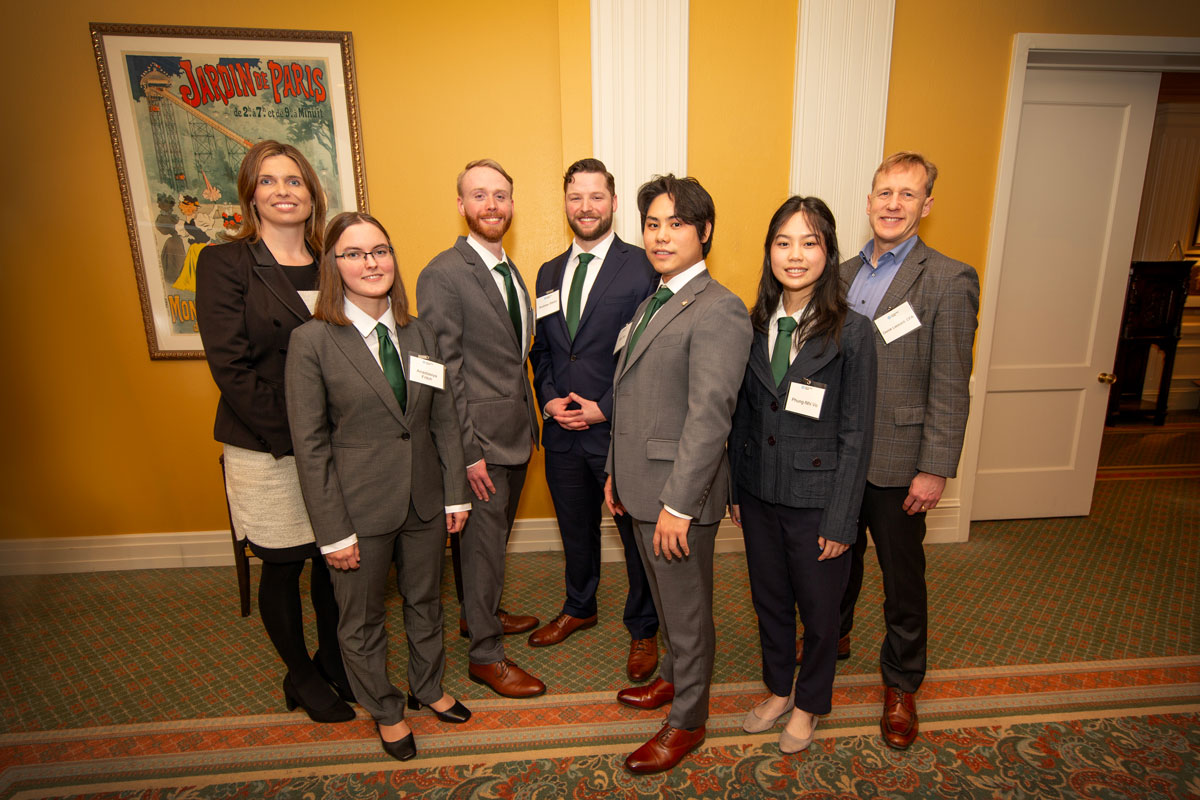Five students from the University of Washington Bothell competed in the Chartered Financial Analyst Institute Research Challenge — a global financial competition that attracts students from 95 countries and more than 1,000 universities, totaling more than 6,000 competitors.
Through the competition, which occurs annually and has several levels, students assume the role of a research analyst and create an analyst report for a company of the CFA’s choosing. Students have approximately three months to prepare before their reports are judged at the local level by CFA Institute members and volunteers.
Once the reports are graded, finalists from each local competition advance to the presentation round, and this year the team from UW Bothell’s School of Business was among those teams chosen as finalists.
“Each year I am impressed by the sheer volume of time and energy the students dedicate to writing their reports,” said Dr. Andrea Anthony, assistant teaching professor and faculty adviser to UW Bothell’s CFA Research Challenge participants. “It seems like a huge task at the beginning, but our students always find a way to get it done and knock it out of the park while doing it. This year’s team was no exception.
“I am so proud of our students’ hard work and how they represented the School of Business.”
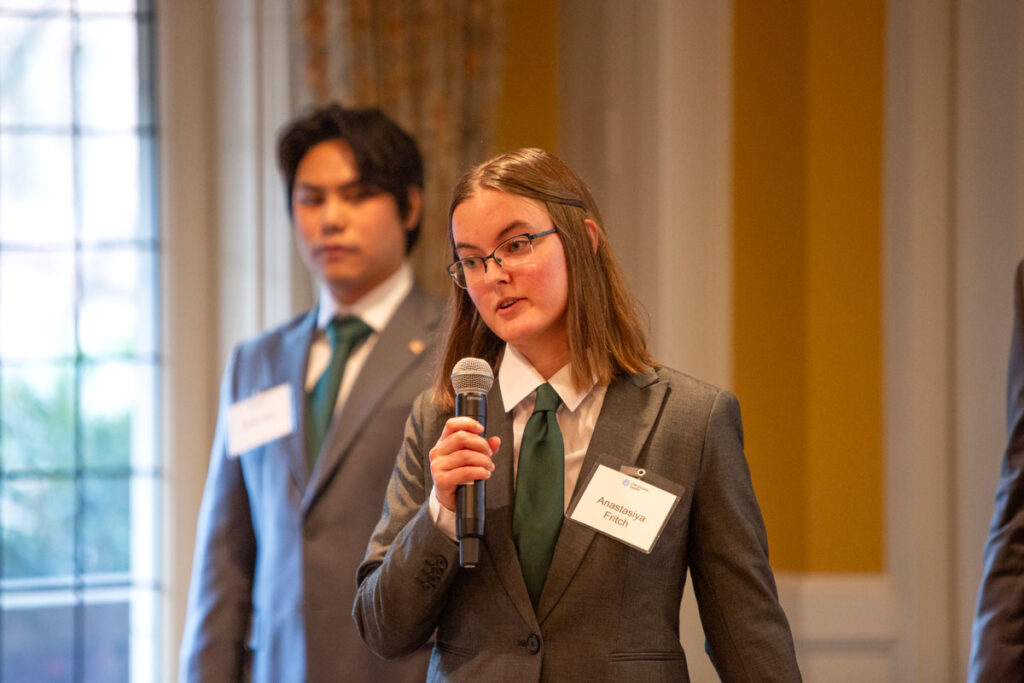
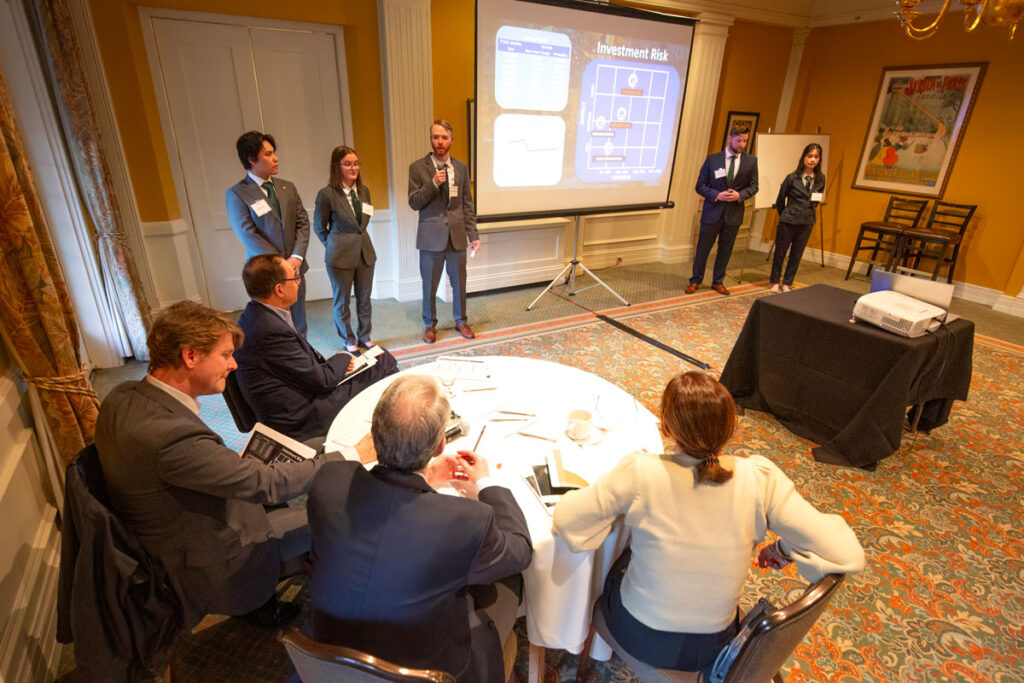
Paired with professionals
Each year, dozens of UW Bothell students apply for the opportunity to take on the research challenge, and because each institution can only be represented by one team of five students, the process is extremely competitive.
“I was really excited to have gotten a spot on the team,” said Kilian Larose, who was selected along with Anastasiya Fritch, Brian Hsu, Phung Vo and Andrew Weiss to represent the School of Business. “I knew how serious the competition was and did not take the responsibility of being chosen lightly.”
The students, all Business Administration majors, began preparing for the competition in October, after the CFA announced Expedia as this year’s company to analyze. Their research endeavor was supported by Anthony as well as by Derek Leonard, financial adviser and certified financial planner with Morgan Stanley, a multinational investment bank and financial services company.
Anthony and Leonard provided the students with mentoring and intensive training in financial analysis and professional ethics. “Andrea helped us stay on track and made sure we did everything at the appropriate time so we didn’t fall behind,” Hsu said. “As a professor in finance, she is also very knowledgeable, and we were able to ask her about just about anything we needed clarification on — even the smaller, nitty gritty things.
“And Derek, our mentor in the industry, was also super helpful in being able to guide us through the complexity of our financial analysis as this was above and beyond any previous project experience we had ever had.”
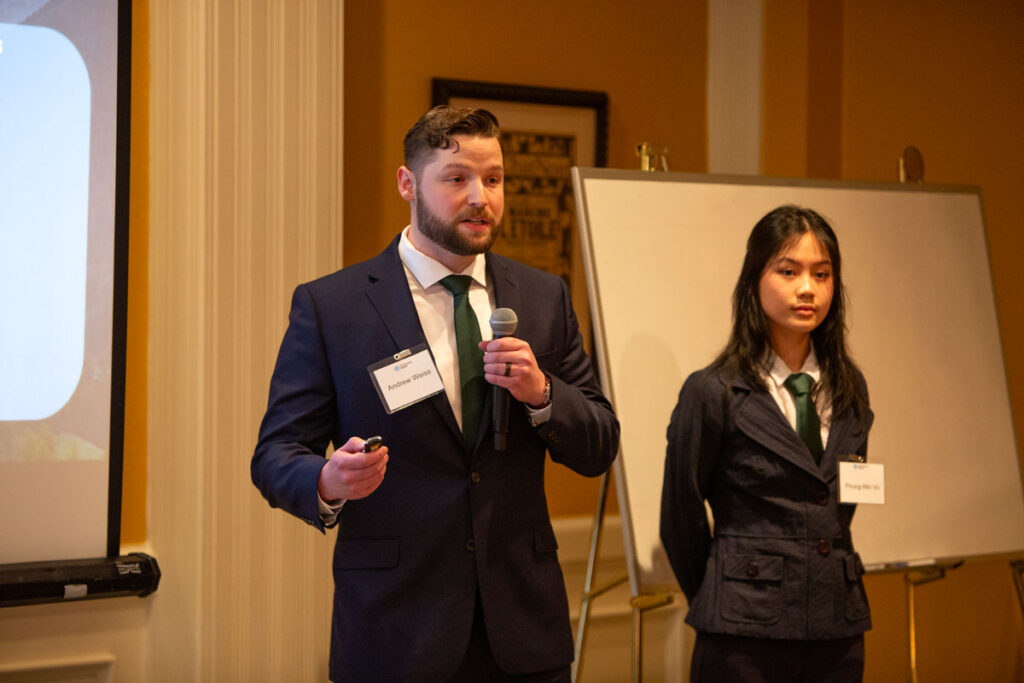
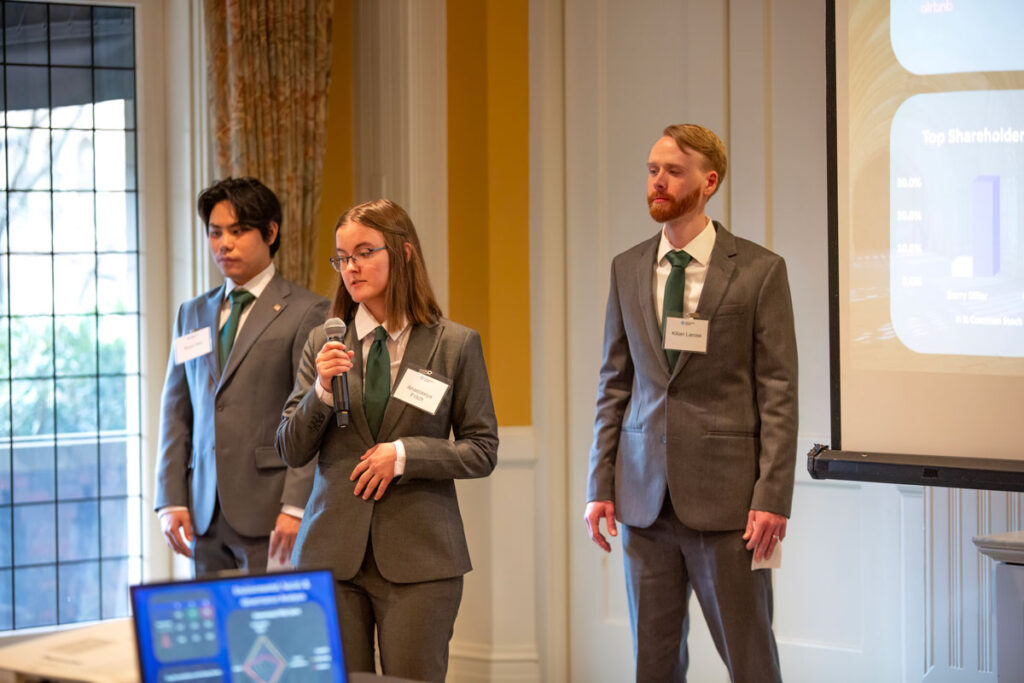
Magnitude of the model
The analyst report students were expected to create would include detailed a recommendation, target price, investment thesis, valuation and investment risks for Expedia. “We were each spending 20 to 25 hours a week on this,” Hsu said. “Most of us, me included, were also full-time students with jobs. It was a lot of work, but we all saw the value in it.”
They began by creating a discounted cash flow valuation — a type of financial model that determines whether an investment is worthwhile based on future cash flows. “A DCF model is based on the idea that a company’s value is determined by how well the company can generate cash flows for its investors in the future,” Hsu explained. “This was the most challenging and the most crucial part of our entire project.”
A key part of building a DCF model is to define and forecast the cash flows that the business will likely generate. “We did a deep dive on the company’s financials and gathered a bunch of historical data. We then carefully analyzed each financial statement to ensure our projections were accurate and as reflective as possible of any future potential scenarios,” Hsu said. “We were meticulous as we recognized this was the backbone for our entire project.”
The students dedicated months to refining the model, adjusting numbers and assumptions, testing different scenarios and validating their projections against the industry standards. “The final step was to integrate all of the outcomes of our DCF into a comprehensive analyst report where we not only provided an investment recommendation, but we also gave a detailed reasoning behind why,” Hsu said.
The final report was then judged by CFA Society Seattle members and volunteers who functioned as local hosts. It took the judges a few weeks to review and rank all the reports before announcing their decision of the three teams who were selected as finalists.
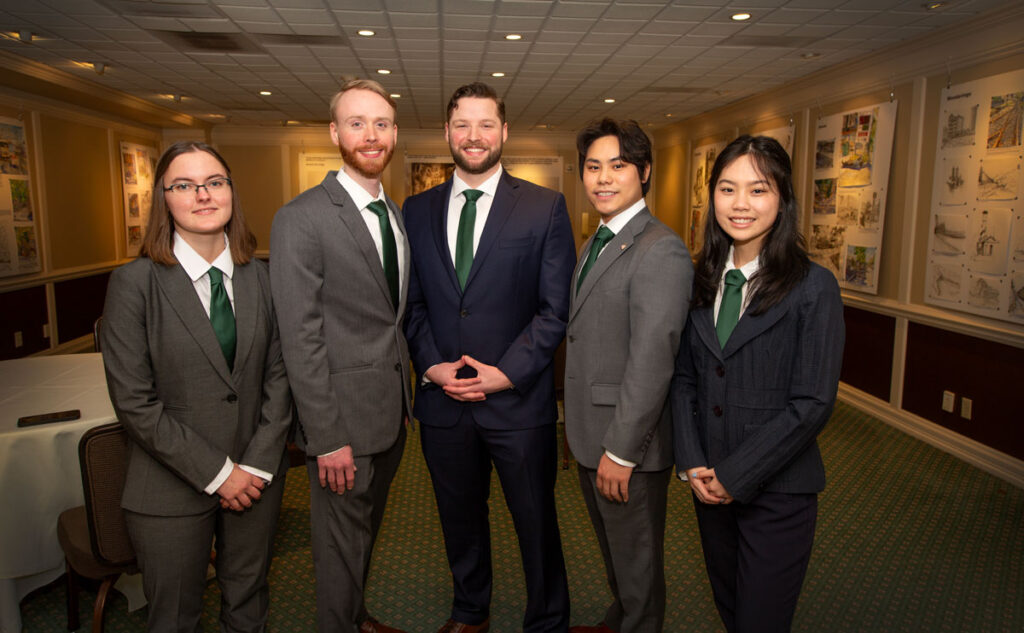
Report gets recognition
For the UW Bothell students, the email announcing their advancement to the next round was cause for celebration. The team could only allow themselves a day or so to enjoy the victory, however, as the turnaround time for the next round was quick. “We only had a week-and-a-half to create and prepare for a 10-minute presentation that detailed a 30-page report,” Larose said. “It was a lot of pressure.”
Hsu noted, “The challenge itself had spanned over roughly three months so by the time the sub-regional competition came around, some things had changed within the company. This meant that in addition to everything else, we also had to update all the numbers, financial analysis and stock prices for Expedia so that we were giving the most up-to-date and accurate recommendations.”
Not only did their report shift, but the audience they were presenting to also shifted. For the next round, the students were judged by different CFA members and industry professionals — and in person. “That was really intimidating because we are just studentsand we had to stand up in front of people who are highly respected and established in the industry,” Hsu said. “I did my best to project confidence, but I would be lying if I said I wasn’t nervous.”
As Anthony noted, “The presentations are especially nerve-wracking as in addition to covering a lot of material, the students must also be ready to answer questions from judges on the spot.
“This year the team practiced for many days, trying to get their arguments and presentation style as strong as possible,” she said. “They admitted that some members of the team were not naturally strong at presenting before this challenge, but they overcame those fears and came across as confident and knowledgeable.”
The experience I gained from this challenge is unlike anything else. Not only did it help me grow as a person, but it also helped me make tremendous strides as a professional.
Brian Hsu, senior, Business Administration
Deliverables of dedication
Although the team didn’t receive the title in the sub-regional competition, the scores between the three finalists were very close. And the students felt that what they did get was something just as valuable as winning: they developed new skills and the confidence to put them to practice.
“The experience I gained from this challenge is unlike anything else. Not only did it help me grow as a person, but it also helped me make tremendous strides as a professional,” Hsu said. “I spoke about my participation in the CFA Research Challenge in an interview at JP Morgan Chase, and I was promoted as a private banker.
“I was first hired as an associate banker, and I was told by my market director that he had never before seen an advancement or a promotion from an associate banker to a Chase private client banker as the leap is so huge.”
Hsu said he is grateful for the impact the challenge has had on his career. “I credit the CFA Research Challenge for giving me the experience I needed to be qualified for such a big career jump. While it wasn’t easy, it was certainly worth it — and I would highly encourage other students interested in finance to participate as the reward far outweighs the work.”

